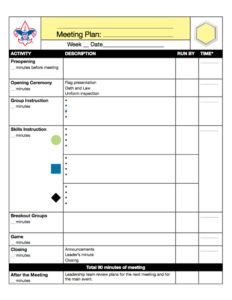Printable PDF file of Meeting Plans & Ideas for Living History
OBJECTIVES
This month’s activities should:
- Show Scouts how to find out about local history.
- Help them understand how the past has impacted how we live today.
- Teach them how to research a time period and place.
- Cover basic life skills from a specific time period.
- Encourage Scouts to create a persona.
- Prompt Scouts to pursue additional activities related to living history.
LEADERSHIP PLANNING
As a leadership team, you may want to discuss the following items when choosing living history as your program feature during your planning meetings.

- How much do we know about our local history?
- Do we know a historian, interpreter, or other expert?
- What do we want to do for a main event?
- Where do we want to do our main event?
- Are there any historical sites where we can volunteer?
- How can our parents get involved?
- What costs will be involved in the activities we want to do?
- To meet our needs, what should we change in the sample meeting plans?
PREOPENING IDEAS
Preopening Ideas on Troop Program Resources
- Show the Time magazine feature on Civil War reenactors
- Create a collection of artifacts or items from different time periods, and have Scouts who arrive early match them to index cards with labeled with different time periods.
- Provide laptops or tablets with Internet access and have Scouts research living history sites and museums within driving distance of your city.
- Invite a local living history reenactor to display his or her gear.
OPENING IDEAS
Opening Ideas on Troop Program Resources
GROUP INSTRUCTION IDEAS
Choosing Your Character
- Explain what living history is.
- Discuss what era and setting the unit will focus on this month.
- Explain the process of choosing a persona.
Finalizing Your Persona
- Lead a group discussion during which participants explain their personas.
Period Cooking
- Discuss how to clean and maintain cooking equipment and utensils properly.
Everyday Skills
- Have a local living reenactor discuss his or her hobby and the research he or she has done.
SKILLS INSTRUCTION IDEAS

Choosing Your Character
 Make an item for your persona, such as a scroll, paper, a tin lantern, a basket, or a leather pouch.
Make an item for your persona, such as a scroll, paper, a tin lantern, a basket, or a leather pouch.
 Begin making a costume using modern-day items for your persona, such as a cape from a wool blanket or a hat or tunic from cotton.
Begin making a costume using modern-day items for your persona, such as a cape from a wool blanket or a hat or tunic from cotton.
 Begin making a costume using original material for your persona, such as hand-sewn buckskins, chain mail, or beaded adornments.
Begin making a costume using original material for your persona, such as hand-sewn buckskins, chain mail, or beaded adornments.
Finalizing Your Persona
 Continue working on persona research.
Continue working on persona research.
 Continue working on persona development, and begin costume design.
Continue working on persona development, and begin costume design.
 Continue working on persona development and costume design.
Continue working on persona development and costume design.- Make a list of persona-appropriate accessories.
Period Cooking
 Create a list of period-appropriate recipes, and develop a menu for the main event. Include a shopping list.
Create a list of period-appropriate recipes, and develop a menu for the main event. Include a shopping list.
 Create a meal plan using only Dutch oven cooking techniques. Include a shopping list.
Create a meal plan using only Dutch oven cooking techniques. Include a shopping list.
 Make a menu using cooking practices that don’t require the use of utensils. Be sure to include different styles of cooking (stick, rock, spit, etc.).
Make a menu using cooking practices that don’t require the use of utensils. Be sure to include different styles of cooking (stick, rock, spit, etc.).
Everyday Skills
 Learn candle making, fire starting, or another period appropriate activity.
Learn candle making, fire starting, or another period appropriate activity.
 Learn about weapons used during the period you are interpreting, such as muskets, crossbows, Civil War arms, or bows and arrows.
Learn about weapons used during the period you are interpreting, such as muskets, crossbows, Civil War arms, or bows and arrows.
 Learn about lodging during the period you are interpreting, such as teepees, lean-tos, or canvas tents.
Learn about lodging during the period you are interpreting, such as teepees, lean-tos, or canvas tents.
BREAKOUT GROUP IDEAS
Getting Ready for the Main Event
- Select a living history time period.
- Begin an outline of persona basics (name, age, birthplace,
etc.) - Finalize persona and costume
- Menu Planning (if applicable)
- Duty Roster Planning (if applicable)
- Patrols discuss what special items they will need for the main event.
Preparation for the meeting’s game or challenge
GAME AND CHALLENGE IDEAS
Library of Games and Challenges on Troop Program Resources
-
- Colonial and Pioneer Games
– Materials: Varies
– Method: Set up a variety of simple period-appropriate games that require minimal equipment. Possibilities include sack races, three-legged races, lawn bowling, horseshoes, marbles, and draughts (checkers). Use a round robin format to let Scouts try different games.
– Scoring: Varies by game.